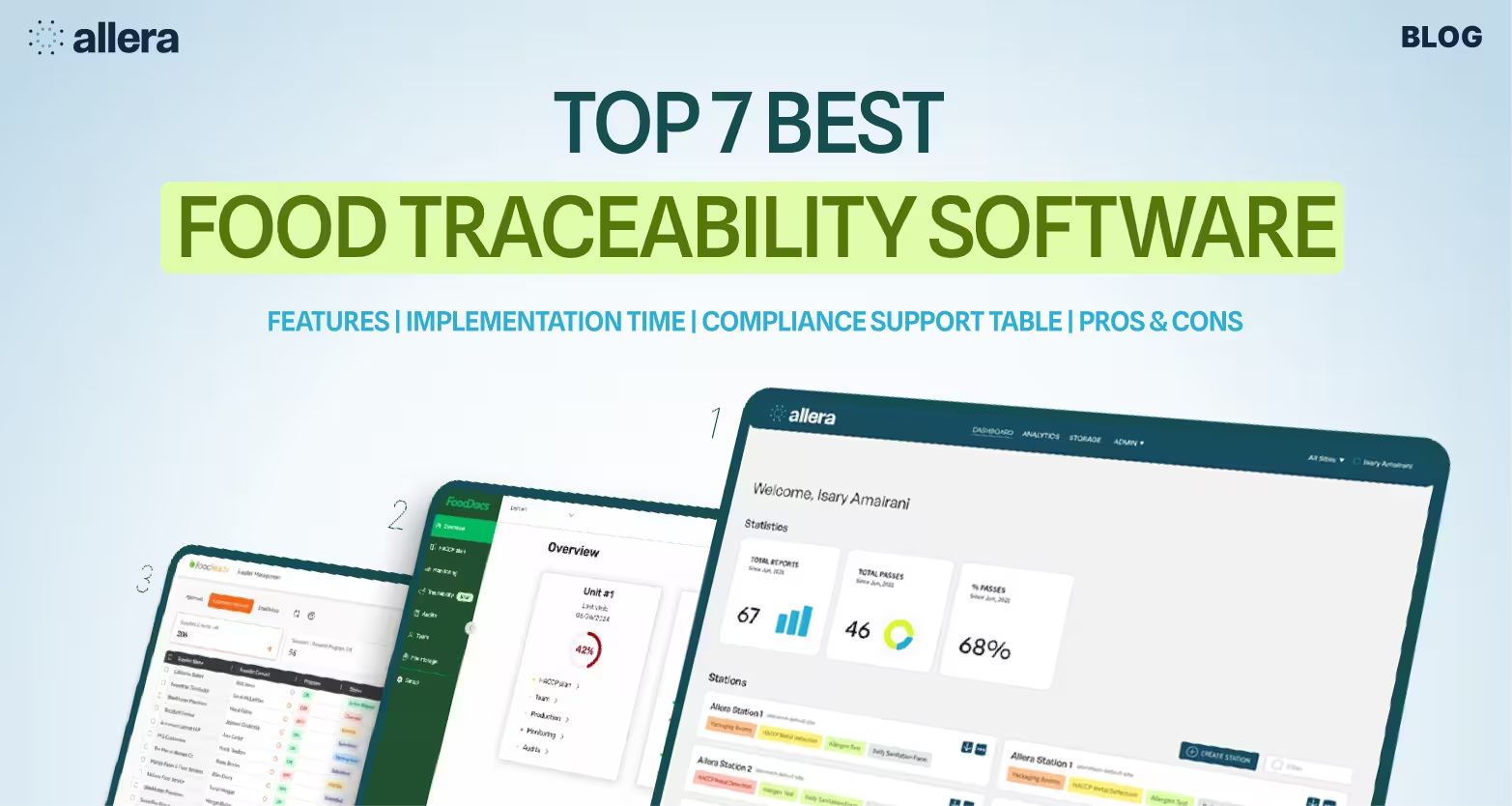
7 Best Food Traceability Software of 2026
Overview:
Food traceability is one of the most crucial elements to keeping your food manufacturing/processing facility safe for customers. Luckily it's been getting far easier to do with food traceability software. In 2026 it's crucial for manufacturers that need real-time visibility, FSMA 204 compliance, and streamlined recall management. Below is our shortlist of the top 7 solutions for 2026.
- Allera – Small to mid sized food manufacturers, processors, and co-packers
- Datahex – Small to large sized food manufacturers, processors, and distributors.
- FoodReady – Best for small/mid-size manufacturers needing templates and AI-assisted records.
- SafetyChain – Best for plant-floor data capture to enterprise-wide QA/traceability.
- FoodDocs – Best for fast FSMS setup and simple digital traceability for SMBs.
- SafetyCulture – Best for mobile-first inspections and operational compliance.
- IBM Food Trust – Best for blockchain-backed, retailer-grade supply chain transparency.
Why Trust Our Software Reviews?
Allera is a provider of food safety software, so it’s fair to ask why you should trust our reviews of competitors. The answer is simple: food safety impacts everyone, and transparency matters. Our reviews are comprehensive, data-driven, and based on what is publicly available from each vendor’s website. We evaluate traceability tools against a consistent rubric: Compliance, Visibility, Ease of Use, Scalability, and Support (rated Great/Good/Fair). Pros and cons are drawn from real buyer priorities, not marketing hype. There is no pay-to-play ranking. If you spot inaccuracies about your product, reach out and we’ll update promptly. Our mission is to make food safer by helping manufacturers choose the best traceability software for their operations.
What to Look for in Food Traceability Software
- Regulatory Compliance: Support for FSMA 204, HACCP, SQF, BRCGS, and international standards.
- Recall Management: Ability to trace forward and backward quickly in case of incidents.
- Supplier Integration: Tools to onboard, manage, and monitor suppliers seamlessly.
- Data Visibility: Real-time dashboards for inventory, production, and distribution data.
- Scalability: Flexible architecture to grow with your business size and complexity.
- Ease of Use: Simple UI and mobile access for plant-floor workers.
Full List of Top 7 Food Traceability Software for Food Manufacturers in 2026
Food traceability in food manufacturing isn’t just a compliance checkbox—it’s a safeguard for your brand and your customers. These software solutions help you stay audit-ready, act fast during recalls, and maintain full visibility from farm to fork.

Allera
Allera Technologies is a modern food safety and traceability software platform designed for food manufacturers and processors. It centralizes supplier management, document control, digital forms, and compliance workflows into one intuitive system. With AI-assisted compliance and real-time traceability, Allera helps companies stay audit-ready while reducing administrative overhead.
Allera Food Traceability Software
Allera Technologies provides a full suite of digital tools to manage suppliers, documents, training, and audits with real-time visibility across the food supply chain.
End-to-end traceability and compliance tools in one platform
- Supplier Onboarding & Management – Dynamic onboarding, expiration tracking, centralized database, in-platform editing, and approval workflows
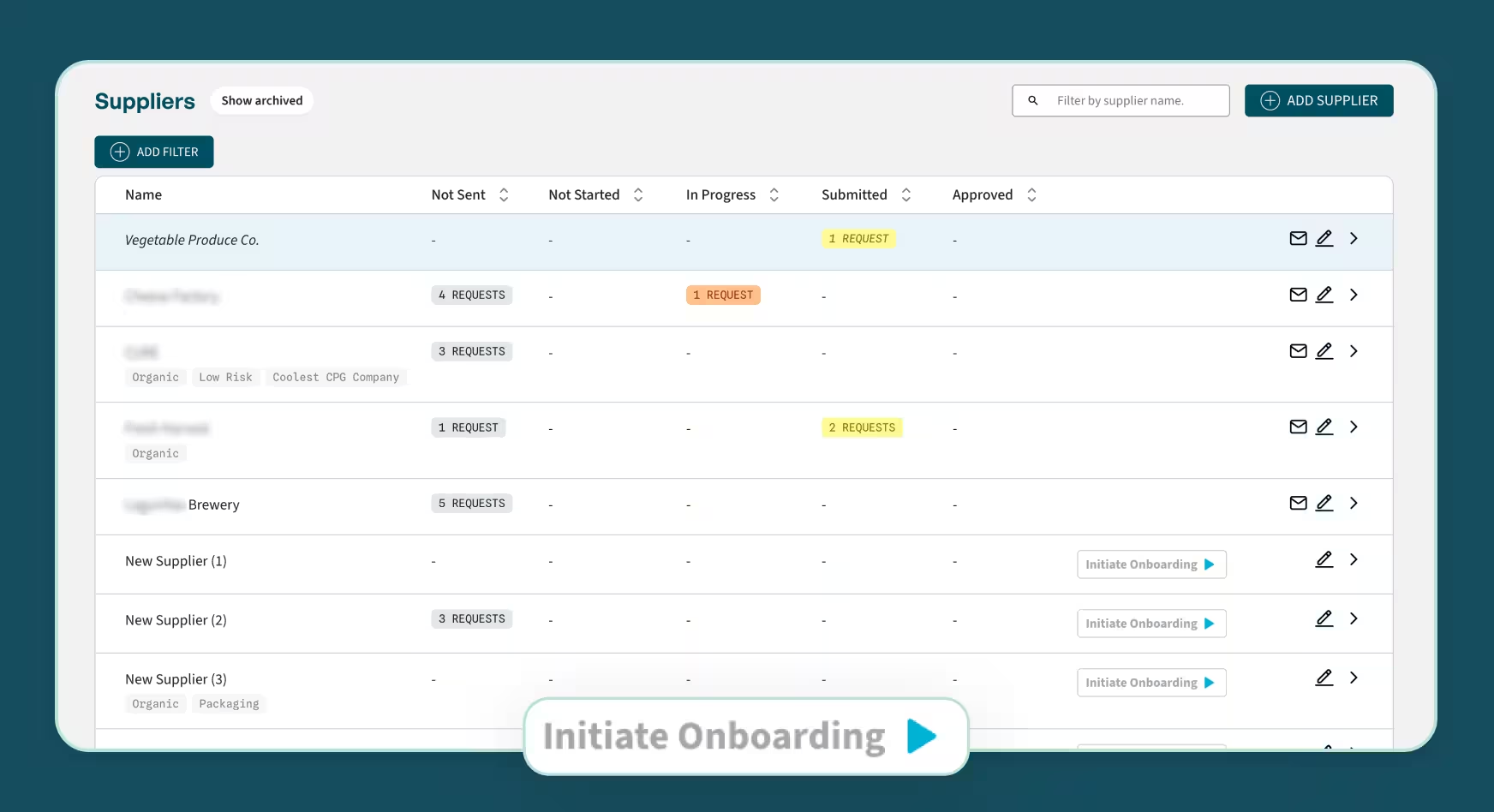
.avif)
- Document Control – Secure version control, access permissions, revision tracking, and AI-assisted SQF compliance review
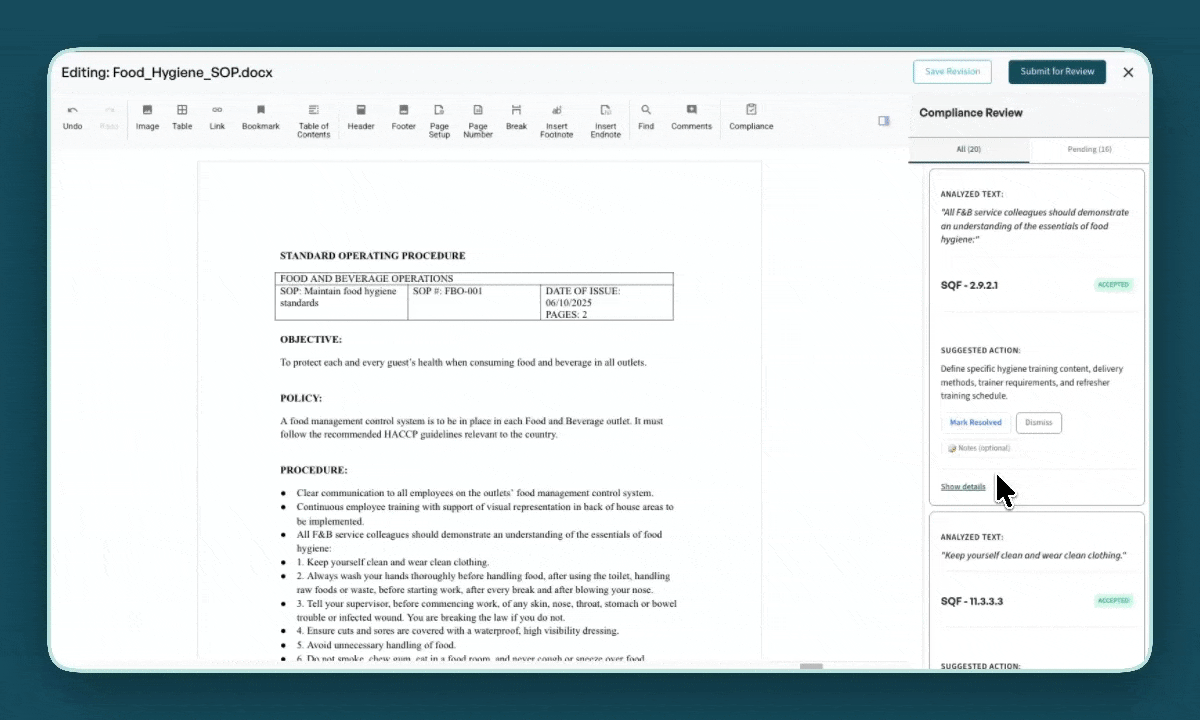
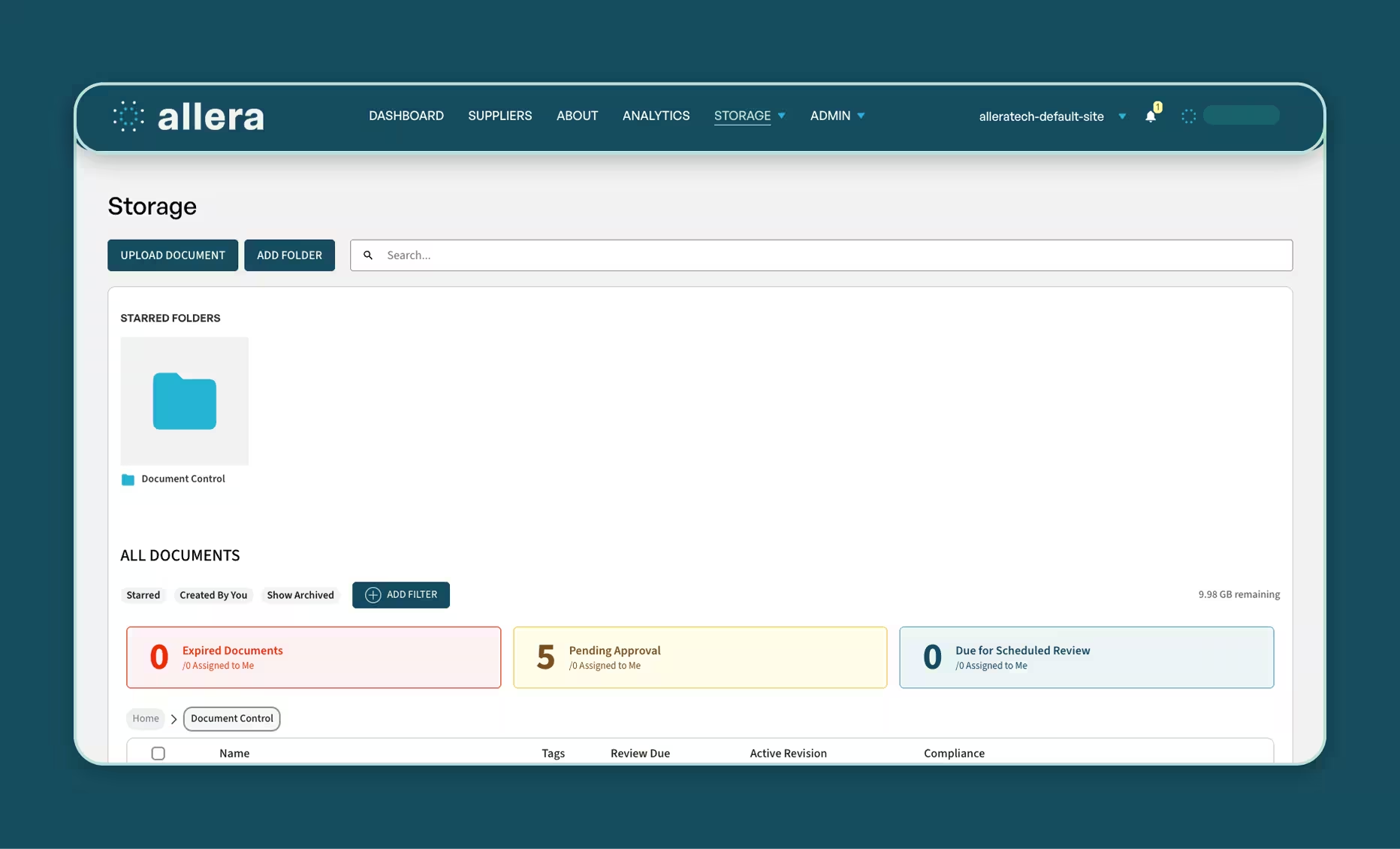
- Training Management – Link SOP updates to employee training, track acknowledgments, and automate notifications.
.avif)
- Digital Forms & Analytics – Mobile-ready forms for inspections, audits, and incidents with real-time dashboards.
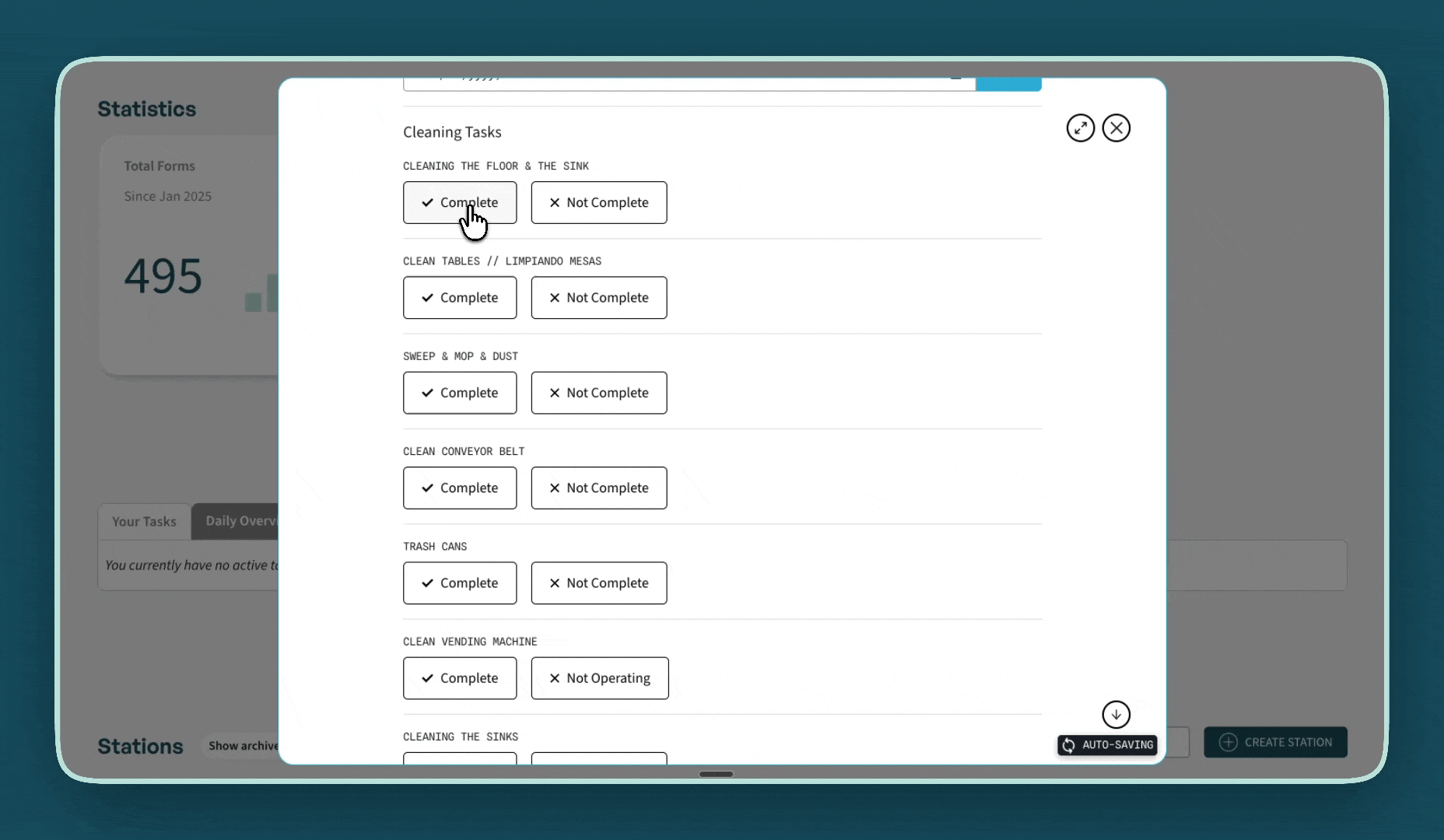
- Audit Readiness – Instant access to compliance records, approvals, and supplier certifications.
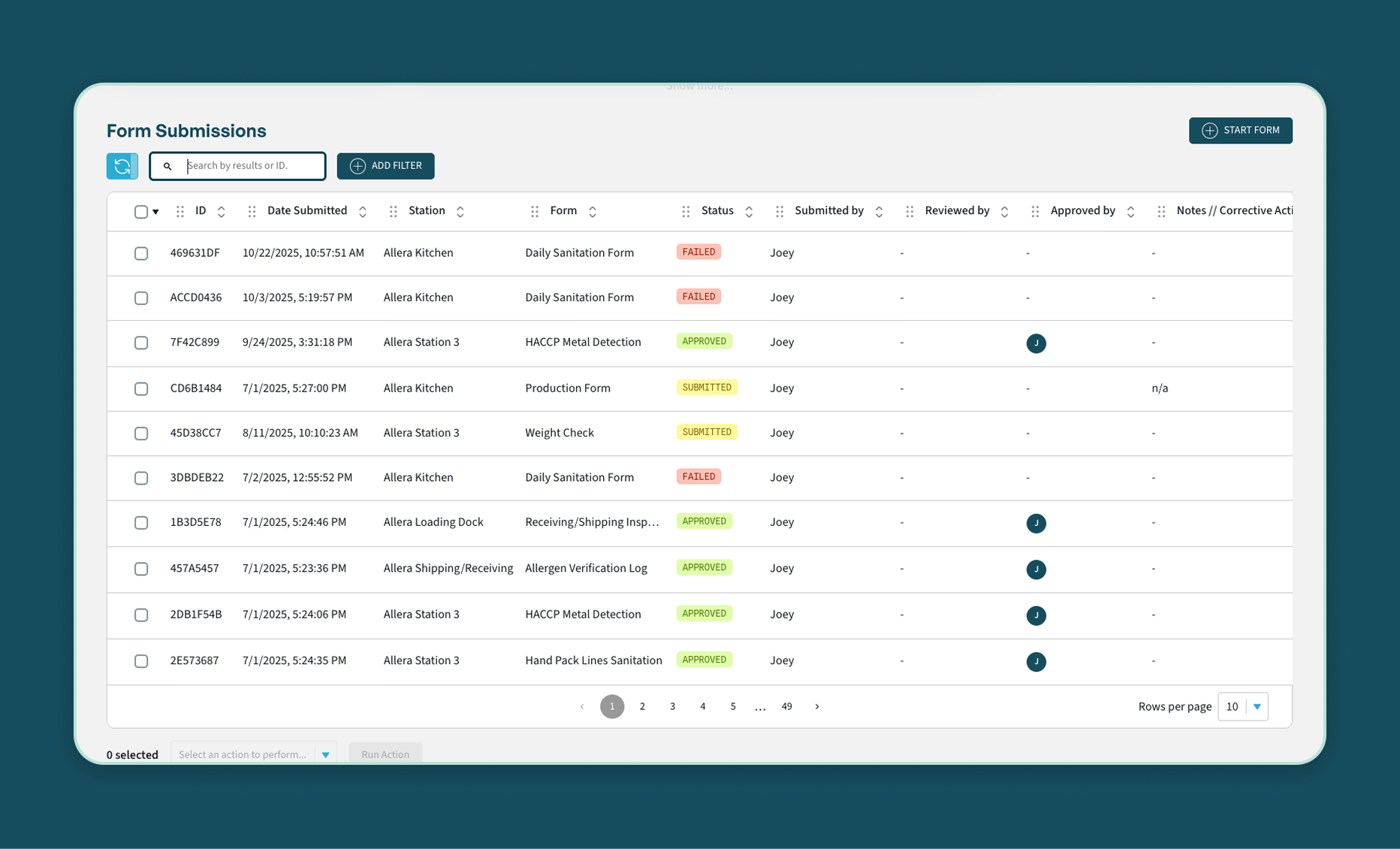
- Traceability & Recall Management – Track ingredients and finished goods forward/backward for FSMA 204, with rapid recall execution.
- Offline & Multilingual Access – Capture data in low-connectivity environments with multi-language support.
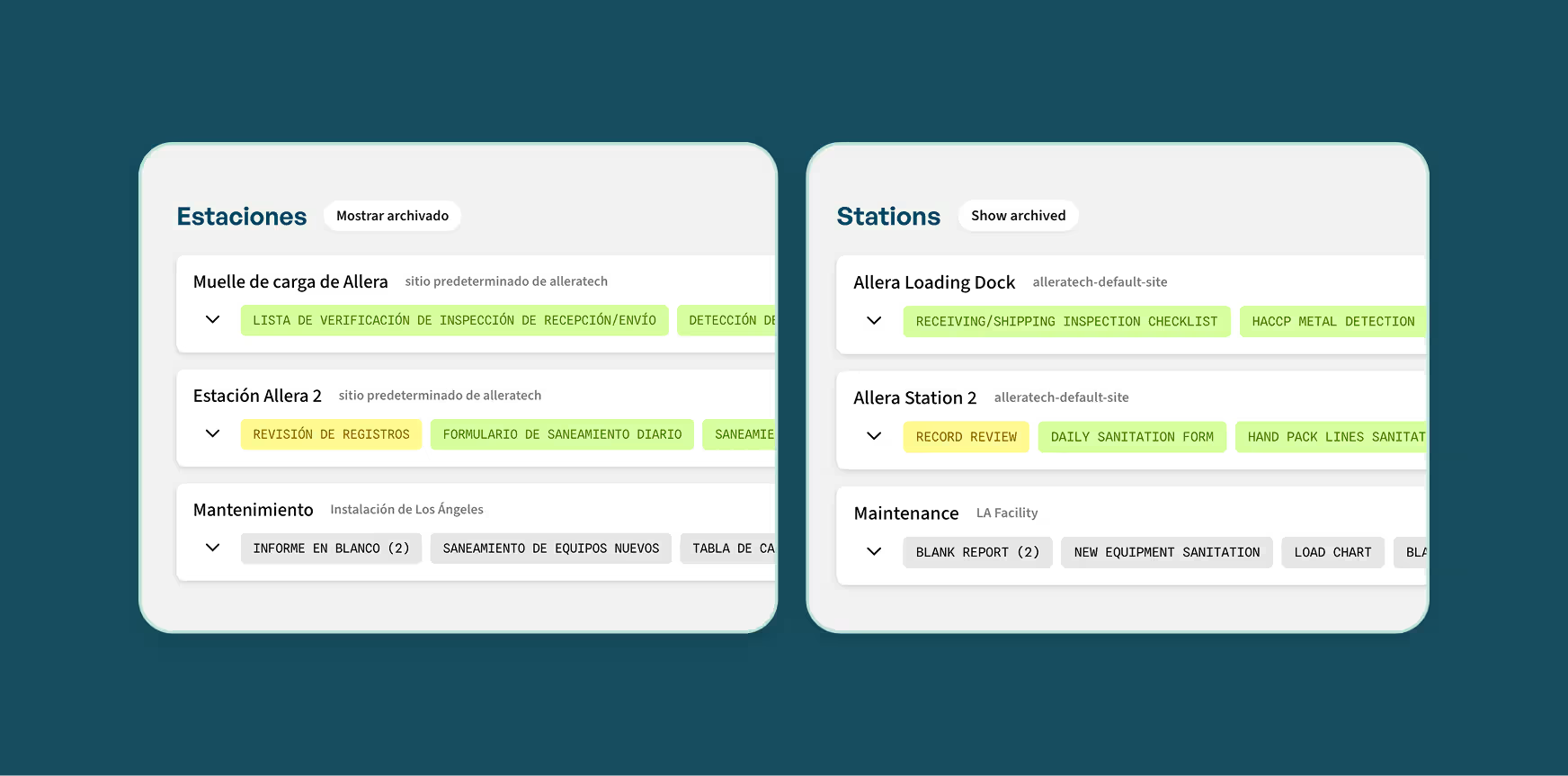
Compliance & Standards in Allera Technologies
Built for global food safety and compliance requirements
Allera Technologies supports digital workflows and audit trails that align with ALL leading food safety standards.
Pros & Cons of Allera Technologies
Balanced insights into Allera Technologies food traceability software.

Pros
- Centralized hub for suppliers, documents, training, and audits.
- AI-assisted compliance reviews to flag potential non-conformances early.
- Flexible document collection (uploads, email responses, magic links).
- Mobile-ready with offline functionality and multilingual support.
- Fast recall execution and FSMA 204–aligned traceability.
- Robust version control, approval workflows, and audit trails.
- Integrated training management tied to SOP updates.
- Scalable digital forms and analytics for inspections and audits.
- Strong onboarding and customer success support.

Cons
- Best suited for food manufacturers, less flexible for other industries.
- Advanced analytics may require extra training to fully use.
- Global supply chains may still need regional customization.
- Not focused on the retail industry.
Overall Rating of Allera Technologies
Allera Technologies offers a modern, scalable solution for food manufacturers seeking stronger compliance, supplier control, and digital traceability.
.svg)
Datahex
Paperless Forms by Datahex helps manufacturers, processors, and distributors meet food traceability recordkeeping requirements with complete and reliable records. During a food recall, companies can trace products in real time across the supply chain. All records are centralized and easy to audit, allowing teams to respond faster to food safety issues. A strong traceability system also helps prevent costly recalls and reduces expenses linked to food safety incidents.
Datahex Features
- Create easy, intuitive digital forms with required fields, calculations, automations, and more to guide your team with constant data capture.
- Link photos, procedures and SOPs directly to forms to support accurate and consistent record-keeping.
- Save and sync records instantly to the cloud, with the capability of receiving instant deviation alerts, giving your team immediate access for review, verification, and sharing.
- Centralize and search for all records, ensuring compliance and reducing audit preparation time. Securely store your records for over two years as required by food traceability regulations.
- Capture and review records in real time, using BI tools to support faster, proactive decision-making and stronger leadership oversight while achieving live snapshots of your site’s compliance.
Compliance & Standards for Datahex
Paperless Forms is fully aligned with regulatory requirements and standards, including HACCP requirements and GFSI scheme expectations, ensuring strong audit readiness and traceability.
Pros & Cons

Pros
- Simple, intuitive interface with mobile access and offline mode makes it easy for teams to use anywhere.
- Customizable digital forms help capture all food safety and regulatory requirements consistently across operations.
- SOPs, procedures,and reference photos can be attached directly in forms to guide employees and support compliance.
- Automated checks and real-time alerts flag deviations immediately, improving preventive control management.
- Quick search and filtering tools allow fast retrieval of any traceability data.
- Audit trails & version control to provide clear visibility on who recorded what and when.
- Ongoing support is available to help you optimize your forms and workflows needs over time.
- Easy-to-use interface for production-floor teams, even with minimal training.
- Capability to link with BI tools for analysis and trending of data

Cons
- Requires an investment at the beginning to equip teams at the plants with devices such as tablets to capture data.
- Requires external analytics integrations to create dashboards and advanced reports.
- Requires some training in order to create and manage new forms.
- Not focused on the retail industry.

FoodReady
FoodReady offers food manufacturers, processors, and foodservice operations tools and expert support to build HACCP/food safety plans, monitor CCPs, manage traceability, and prepare for regulatory or third-party audits.
Key traceability & compliance features in FoodReady
The platform includes these features to support traceability, audits, and compliance workflows:
- AI HACCP / Food Safety Plan Builder with hazard analysis & process flow charts
- Lot tracking, batch management, and ingredient-to-distribution traceability
- Supplier document management & automated approval workflows
- Recall management & mock recall drills
- Mobile checklists, CCP / operational monitoring with Bluetooth / temperature log integrations
- SOP & Checklist library with drag-and-drop / multi-language support
Compliance & standards for FoodReady
FoodReady supports compliance referencing many standards by software, templates, and consulting; formal certifications depend on customer use and audit outcomes.
FoodReady: Pros & Cons
Many users praise rapid compliance gains & strong traceability; some trade-offs around cost and complexity.

Pros
- Strong support for FSMA 204 and US regulatory requirements
- AI tools reduce paperwork & speed HACCP / Food Safety plan creation
- Traceability from ingredient sourcing through final distribution
- Good mobile / multi-facility support & supplier workflows

Cons
- Pricing not transparent and may be high for small single site operations
- Implementation / setup may require training & consulting input
- Some features region-specific (local regulatory variance) may require configuration
- Formal certifications (ISO 22000, FSSC) unclear / not proven publicly) for all customers
FoodReady — Overall Rating
FoodReady delivers strong traceability and regulatory compliance aid, with good usability and moderate scalability depending on operation size.

SafetyChain
SafetyChain helps process manufacturers unify quality, compliance, and operations by digitizing inspections, audits, document controls, real-time monitoring, and supplier programs.
Key traceability & compliance features in SafetyChain
Features that enable traceability, audit readiness, and regulatory compliance across plant operations:
- No-code digital forms for inspections, HACCP, GMP, sanitation, receiving checks
- Document repository with versioning & auditor access
- Corrective & Preventive Actions (CAPA) workflows
- Real-time monitoring of CCPs, process quality, deviations, and alerts
- Supplier compliance & performance tracking
- Regulatory & industry certification compliance dashboards and audit sign-offs
Compliance & standards for SafetyChain
SafetyChain supports many certification and regulatory compliance frameworks by providing tools, records, and workflows to help maintain audit-readiness and traceability.
SafetyChain: Pros & Cons
Users praise its strong audit readiness, real-time insights, and compliance breadth, though implementation and cost can be barriers for some.

Pros
- Comprehensive regulatory and standards coverage (SQF, BRC, FSMA, GMP etc.)
- Real-time and plant-wide visibility into quality, safety, and performance
- Supplier and audit documentation well organized and accessible
- Scalable toolset for operations + quality teams

Cons
- Longer implementation time (~6 months) for full deployment
- Price and complexity may be high for smaller or single site operators
- Some feature customizations needed for specific trace-forward/lot-level supply chain complexity
- Some users note reporting flexibility could improve
SafetyChain — Overall Rating
Strong in compliance and traceability; ease of use and scalability are good, with more effort needed for smaller operations.

FoodDocs
FoodDocs enables businesses (producers, ready-to-eat, service) to digitize HACCP plans, traceability logs, recipe management, audits, and recordkeeping with mobile/web apps for real-time oversight.
Key traceability & compliance features in FoodDocs
Some of FoodDocs’s main features that support traceability, compliance, and operational efficiency:
- Digital HACCP plan builder (with CCPs, SOPs, PRPs) in ~1 hour
- Traceability logs & batch tracking to enable recall readiness
- Recipe book with allergen matrix and recipe scaling
- Shelf-life tracker and expiry / batch date management
- Real-time dashboards & notifications for task/monitoring completion
- Customizable audit templates, corrective actions & internal audits
Compliance & standards for FoodDocs
FoodDocs offers tools, templates, and workflows designed to align with several food safety and quality standards; while it aids in preparation and compliance, formal third-party certifications depend on the business using it.
FoodDocs: Pros & Cons
Users generally see strong gains in efficiency and compliance clarity, though some trade-offs exist.

Pros
- Rapid setup and intuitive interface
- Comprehensive traceability & HACCP tools built-in
- Allergen & recipe management features reduce risk of errors
- Good cloud-based audit & monitoring task tracking

Cons
- Price may be steep for small single-location businesses
- Full feature access often requires higher plan / custom setup
- Some features regionally dependent (e.g. regulatory/local compliance differences)
- Relies on mobile app usage & staff adoption to get full benefit
FoodDocs — Overall Rating
FoodDocs scores well in traceability and compliance support, with strong ease of use but with scalability & cost caveats for smaller operations.

SafetyCulture
SafetyCulture helps food businesses (especially small/medium/hospitality/foodservice) digitize audits, inspections, and traceability tasks with mobile tools, enabling faster response, better documentation, and operational oversight.
Key traceability & compliance features in SafetyCulture
Some of SafetyCulture’s capabilities that support traceability and food safety management:
- Customizable checklists & inspections with photo/document evidence
- Audit trails: timestamped records of inspections and issue tracking
- Incident reporting and corrective actions documentation
- Document management (storage, versioning) for policies, logs, compliance docs
- Supplier / FSMS Supplier Audit templates
- Training & educational content / learning management tools
Compliance & Standards for SafetyCulture
SafetyCulture supports features and templates that help with food safety compliance, though many certifications rely on how the user applies the platform rather than built-in “certified” status.
SafetyCulture: Pros & Cons
What users tend to praise vs where the tool has limitations:

Pros
- Very good mobile/web usability for inspections and audits
- Strong record keeping & audit trail capabilities
- Flexible templates and many built-in checklist options
- Affordable entry (per-seat model) for smaller operations

Cons
- Limited built-in deep traceability of raw material supply chains (beyond audits & inspections)
- Not explicitly certified for many standards (SQF, BRCGS etc.) in product literature
- Feature gaps for large-scale recall management / downstream trace‐forward capabilities
- Some deployment customization needed for larger / complex food manufacturers
SafetyCulture — Overall Rating
Considering the tool’s strengths in audits and compliance documentation, and its more modest traceability and scalability in very large operations.

IBM Food Trust
IBM Food Trust is built on Hyperledger Fabric, allowing growers, manufacturers, distributors, and retailers to trace products in seconds, standardize data with GS1, and accelerate recalls with immutable records.
Key traceability features in IBM Food Trust
The platform combines blockchain with GS1 standards to provide secure, auditable data exchange and faster traceability.
- End-to-end trace-forward and trace-back
- Secure certificate/document sharing
- GS1 and GDST standards interoperability
- Permission based access and APIs
- Rapid recall and incident management
Compliance & standards with IBM Food Trust
IBM Food Trust includes FSMA 204 recordkeeping, blockchain-enabled audit trails, and interoperable standards support to help businesses meet compliance needs.
IBM Food Trust: Pros & Cons
Users highlight its strengths in scalability and traceability, while noting some challenges with pricing and adoption.

Pros
- Enterprise-grade blockchain security
- Comprehensive traceability across supply chains
- Rapid recall capabilities
- GS1/GDST standards compliance
- Strong FSMA 204 compliance support

Cons
- Premium pricing may exclude small firms
- Implementation can be resource-heavy
- Limited explicit certification coverage
- Requires partner adoption for full benefit
IBM Food Trust — Overall Rating
IBM Food Trust provides excellent scalability and traceability, balanced by more moderate ease of use and compliance breadth.
Why Food Traceability Software Is Important for Food Manufacturers
Food recalls are costly and can damage brand trust overnight. With traceability software, you can:
- Pinpoint contaminated products in minutes instead of days.
- Maintain continuous compliance with evolving food safety regulations.
- Streamline communication with suppliers and auditors.
- Gain real-time visibility into production, distribution, and inventory.
- In a global supply chain, traceability is no longer optional—it’s the backbone of food safety.
Closing Section: How We Made Our Picks
How We Chose the Best Food Traceability Software
Our rankings are based on a structured rubric that balances compliance readiness, visibility, ease of implementation, scalability, and ongoing support. Each software was reviewed using publicly available information from vendor websites, case studies, and product documentation. We excluded pay-to-play bias and focused solely on features that matter to food manufacturers.
Additional Context
The term traceability software food industry has grown in importance with the FDA’s FSMA 204 Final Rule, which requires detailed recordkeeping for high-risk foods. Whether you’re a small producer or a global enterprise, adopting traceability technology is a proactive step toward avoiding costly disruptions and protecting consumer trust.
How Allera Can Help with Food Traceability
Allera goes beyond basic lot tracking. Its AI-powered compliance tools, supplier onboarding workflows, automated document control, and recall readiness features give you confidence in meeting FSMA 204 requirements. You can link supplier documentation directly to product lots, manage approvals with version control, and act fast if a recall occurs. With centralized dashboards, offline data capture, and training management tied to SOPs, Allera simplifies traceability from end to end.
If you’re evaluating traceability solutions, Allera is designed to help food manufacturers move faster, stay compliant, and reduce risk across the entire supply chain.

.svg)